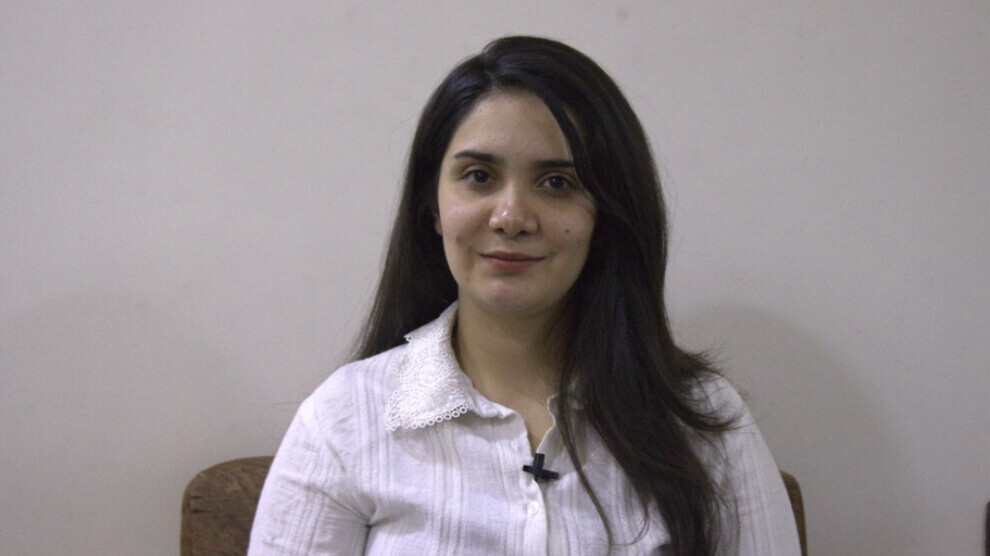Building Syria’s Future Requires Decentralization and Fair Representation for All Communities
Member of the Presidential Body of the Syrian Democratic Council (SDC), Shira Osi, urged national forces to assume their responsibilities and to view Syria’s political landscape with greater depth and accountability.

Shirin Mohammed
Qamishlo — Amid Syria’s painful and prolonged reality, the urgent need for a decentralized political system has become increasingly clear. Decentralization is seen as a strategic path toward restoring stability, ensuring local participation in governance, and preventing the eruption of a full-scale civil war — a call that has been consistently voiced by the Autonomous Administration of North and East Syria (AANES).
Member of the Presidential Body of the Syrian Democratic Council (SDC), Shira Osi, urged national forces to assume their responsibilities and to view Syria’s political landscape with greater depth and accountability. She emphasized that rebuilding Syria’s future must rest on entirely new foundations — ones that reject centralization and embrace democracy, pluralism, and cultural diversity, while guaranteeing equal rights for all Syrians, particularly women, who remain largely marginalized in the current reality.
Syria today faces escalating armed conflicts and massacres that claim thousands of lives daily amid ongoing political and security chaos. This situation places the country at serious risk of fragmentation and collapse. In light of this grim reality, Osi stresses that adopting decentralization is not merely a political preference — it is a necessity to restore stability and safeguard Syria’s unity.
“Syria is witnessing rapid political developments, especially after more than thirteen years of crisis,” Osi said. “We now stand at a decisive crossroads. Syrian national forces must act responsibly and analyze the political scene deeply, understanding the complex, historical roots of the conflict and their implications for our future.”
“When we speak of rebuilding Syria’s future, it must be on entirely new foundations — not on the ruins of the old regime. Since the Baath Party came to power, Syrians have suffered decades of violence and destruction. After the regime’s fall, people hoped for a democratic and just life — but the reality turned out quite the opposite.”
Osi made it clear that the goal should not be to recreate a centralized state under a new, so-called democratic guise, but rather to build a democratic, pluralistic, and decentralized republic that respects the rights and cultures of all its communities. She pointed to the continuing exclusion of large segments of society — especially women — from political participation, describing today’s reality as an echo of the same marginalization Syrians endured for decades.
“Decision-making remains centralized in the capital, without genuine representation for different communities or a real role for women,” she said. “This exclusion is evident in national dialogue conferences, constitutional declarations, and even parliamentary elections that failed to reflect Syria’s social diversity, offering only one color — one voice — and deliberate exclusion of others.”
The Importance of National Dialogue for Protecting Syrians’ Rights
Osi underscored the importance of a national dialogue table where Syrians themselves can decide their fate and safeguard the rights of all groups — so that decades of marginalization and oppression are not repeated. She highlighted the historical injustices faced by the Kurdish people, who were denied even the right to speak or study in their own language.
“The current constitutional draft does not ensure representation for different communities, nor does it guarantee fair participation for women,” she said. “The only viable solution for Syria lies in adopting decentralization — it is the clearest path toward lasting stability after years of bloodshed and destruction.”
Osi also referred to the Autonomous Administration’s model in North and East Syria as a living example of successful decentralization, offering equal representation for all groups, and gender parity with 50% participation for women and men. “This model allows women to express their voices and truths freely,” she noted. “It seeks to free all peoples from destruction, chaos, and endless wars.”
“The Interim Government’s Extremist Mindset Deepens the Syrian Crisis”
Osi criticized the Syrian Interim Government for its exclusionary approach toward women, despite their central role in the revolution and resistance. “The interim government enforces restrictions on women, even imposing the hijab and limiting their freedom of expression,” she said. “Syria must rid itself of this narrow, patriarchal mentality. The government should prioritize the interests of the Syrian people over the agendas of foreign powers intervening in Syrian affairs.”
She warned that if the interim government continues down its current path, the crisis will deepen: “Syria cannot be rebuilt in one image or one color. If the government persists in this thinking, we will face even greater wars. The transitional phase must reflect the people’s aspirations — not decisions imposed from above, as happened in the recent elections that excluded popular participation.”
Despite her criticism, Osi expressed cautious optimism regarding relations with the Damascus government, emphasizing the need for cooperation between all national forces and the interim authorities to guide Syria toward safety and unity. “We are living a critical, defining moment in Syria’s history — one that will determine the fate of its people,” she said. “That’s why cooperation is essential. The Syria we seek is one built on true patriotism, democracy, decentralization, and pluralism.”
Renewed Call for a Comprehensive National Conference
Osi concluded her remarks by renewing the call for a comprehensive national Syrian conference — one that includes all communities and lays the foundation for a new constitution reflecting the will of the people. She demanded equal rights for women and genuine gender parity in all sectors, especially in political life, while rejecting any decisions made without women’s participation.
“Only an inclusive, democratic, decentralized Syria — one that embraces all its people — can truly rise from the ashes of war,” she affirmed.
